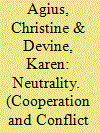| Srl | Item |
| 1 |
ID:
107614


|
|
|
|
|
| Publication |
2011.
|
| Summary/Abstract |
This article approaches 'neutrality' as an essentially contested concept and traces its meaning and purpose over centuries-long historical timelines and situated political, societal and security contexts. It distinguishes neutrality from other concepts such as 'neutralization' 'non-belligerency', 'non-alignment', 'military non-alignment', 'military neutrality' and 'non-allied'. The article explains the politics of defining neutrality in the current European political and legal landscape and in the context of shifting definitions and practices of war, peace, security and state sovereignty. This episteme-based analysis focuses on changes to neutrality in accordance with the rise and fall of particular empires and international actors over time, and changes to its status linked to the development and reification of particular meta-theoretically-based subfields of International Relations and Political Science, setting the background to this special issue of Cooperation and Conflict. A renewed emphasis on the normative aspects of neutrality (i.e. the role of domestic values, politics, preferences, history and mass publics in foreign policy formulation) is achieved by employing a range of perspectives, characterized by increased pluralism in levels of analysis and theoretical approaches. Through this pluralism, authors engage with (1) the strategic and normative drivers underpinning the norm of neutrality, (2) the potential for neutrals to serve as norm entrepreneurs in the field of peace promotion, (3) the tenuous legal status of elites' quasi-neutral foreign policy constructions underpinned by tensions between discourses and practices and (4) the discursive strategies underpinning the move from neutral states' traditional forms of neutrality to what is termed 'post-neutrality' in the current politico-legal context.
|
|
|
|
|
|
|
|
|
|
|
|
|
|
|
|
| 2 |
ID:
113735


|
|
|
|
|
| Publication |
2012.
|
| Summary/Abstract |
This rejoinder article takes the contributions in the Special Issue of Cooperation and Conflict - Vol. 46(3) - on Neutrality and 'Military Non-Alignment' as point of departure for a discussion of some of the problems former neutrals face in shaping their foreign and security policies. The author argues that current and future developments regarding neutrality norms are dependent on internal factors such as national identity and public opinion, and on external factors such as the military non-aligned states' relationships to EU, NATO and, not least, the UN. The possibility of a 'Second Option' of full-scale military cooperation if a preferred neutral position fails is discussed. Increased UN activism, for example, connected with the R2P concept and the tendency to outsource major UN-mandated military operations to NATO, is touched upon as well as the Libya crisis of 2011 and some of its implications for European foreign and security policy cooperation. Special attention is given to current Swedish debates on military non-alignment and NATO membership.
|
|
|
|
|
|
|
|
|
|
|
|
|
|
|
|